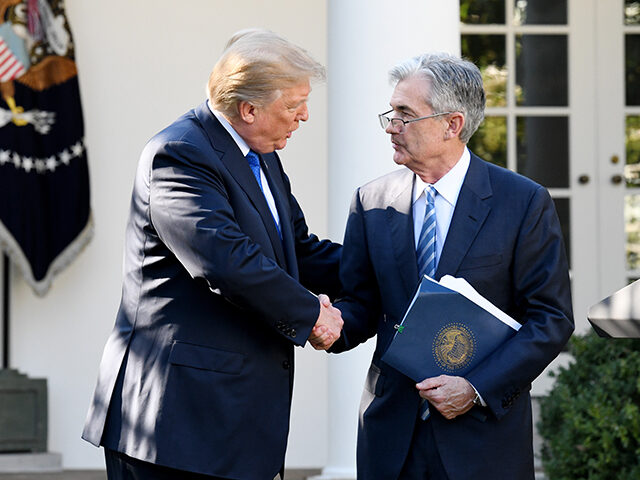Breitbart Business Digest: Trump Will Love the Fed Doves
 Olivier Douliery/Bloomberg via Getty Images
Olivier Douliery/Bloomberg via Getty Images
October Inflation Shows the September Cut Was a Mistake
The October inflation report can be added to the growing body of evidence that the Federal Reserve cut rates prematurely in September.
At first glance, the report seems rather mild. The consumer price index (CPI) rose 0.2 percent, the Department of Labor said Wednesday. That matches the rise reported for July, August, and September. That’s not perfect—ideally you would want inflation to still be falling rather than stabilizing—but does not look alarming.
If you look a bit deeper, however, you see a significant increase in inflation. Before rounding, the index rose 0.24405 percent, up from 0.17987 percent in September. So, inflation picked up by 0.06 percentage points and hit its highest level since April.
You can see this is a troubling trend toward higher inflation in the chart below.

To put this in perspective, the October result annualizes to around three percent inflation, also the highest since April. Three-month annualized inflation, which many economists look to as an indicator of underlying pressure, rose to 2.5 percent from 2.1 percent. The 12-month inflation number that most people will read about in the financial press rose to 2.6 percent from 2.4 percent.
Core inflation came in at 0.3 percent from a month earlier. Before rounding it actually ticked down a bit, from 0.31241 percent to 0.28017 percent. This dropped the one-month annualized rate to 3.4 percent from 3.8 percent. But because some of the softer numbers from late-spring and early summer are dropping out of the three-month window, the three-month annualized rate picked up to 3.6 percent from 3.1 percent.
Median CPI, as calculated by the Cleveland Fed, came in at 0.3 percent for the month. It has been stuck at that level for the past four months, higher than it was earlier in the year. This is a sign that underlying inflation is not actually declining any further but has become stuck at an elevated level more consistent with three percent inflation than the Fed’s two percent target.
The ability of median CPI to forecast inflation has been quite strong throughout this cycle. Wall Street’s analysts could probably just close the tabs on the spreadsheets they use to calculate their inflation estimates and forecast core inflation to come in at the prior month’s median.
Jason Furman pointed out that what we’re seeing is a sign that inflation never really went away. The decline in late spring and summer was, well, transitory.
The Fed, however, has committed itself to a rate cutting path that it cannot back off from without a shock. It is very likely to cut again in December and then to cut at every other meeting next year.
The Doves Are Alight All Across Washington Now
Will this be enough for Donald Trump? The president-elect would very likely prefer to see the Fed cut interest rates quickly next year and may object when the Fed chooses to pause. But he probably will not become too agitated if the Fed communicates that it intends to keep cutting throughout the year. In fact, if the Fed pauses in January—which we view as likely—it will probably wind up cutting in March, at the first meeting after Trump is sworn in as president.
This is one reason we think the fears of a clash between Trump and Fed Chair Jerome Powell are overhyped in the financial press (although markets certainly do not seem to share this fear). The Fed is in a rate cut cycle just as Trump is coming to the White House. This is very different from the situation in 2017, when Trump was beginning his presidency at the start of a rate hiking cycle. This time we will have doves in the White House and the Eccles building.
And Trump should be careful what he wishes for. The surge of inflation crippled the Biden presidency and the Harris candidacy. A resurgence of inflation would be very bad for Trump’s plans and could derail support for tariffs, tax cuts, and even deregulation. Trump’s agenda will be boosted by price stability and undermined by inflation.
Source link

